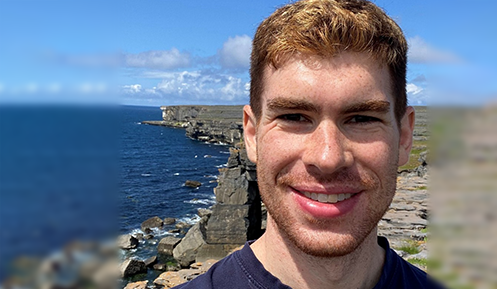
Hi all! My name is Drew Danelesko and my pronouns are he/him. The pronunciation of my name can be heard here. I am fluent in English, but also speak conversational Spanish, German, and Portuguese.
My Roots
My ancestors are Metis, Ukrainian, Irish, German, Dutch, and Norwegian, meaning I have both Indigenous and settler heritage, but my childhood was largely shaped by Ukrainian culture and traditions from my father’s family. My Metis ancestors lived on Lac Ste. Anne, in one of the first Metis villages in what later became Alberta. My Metis grandmother was disconnected from her family, community, and culture after she married my Ukrainian grandfather. Her assimilation was encouraged by patriarchal, anti-Indigenous, and familial forces. I have found this to be a common experience for many Metis from my generation, meaning that we are reconnecting with our Indigeneity and are often the first generation to do so. I feel an exceptional amount of pride to honour my Metis ancestors, elders, and culture everyday and strive to continually deepen Indigenous ways of being in myself and others. I am also in the process of becoming a Citizen of the Metis Nation of British Columbia.
I was born on the traditional Treaty 7 territory whose signatories include: the Piikani Nation, Kainai Nation, Iethka Stoney Nakoda Nation, consisting of the Chiniki, Bearspaw and Good Stoney Bands and the people of the Tsuut’ina Nation who lands are where Calgary is now located. I moved to the traditional, ancestral, and unceded territory of the xʷməθkʷəy̓əm (Musqueam), Sḵwx̱wú7mesh (Squamish), and səlilwətaɬ (Tsleil-Waututh) nations, now known as Vancouver, in 2014 as an uninvited guest. I am endlessly grateful for the xʷməθkʷəy̓əm’s stewardship of this land. Prior to my move to Vancouver, I also lived in Germany, Brazil, and Hong Kong.
In Society
I am socially positioned as a white passing Indigenous person who is also a descendant of settlers. This has provided me with immense privilege in our white supremist Canadian culture, but also impacted my ability to feel belonging and acceptance within my own Metis community as a result of experiencing lateral violence. I am CIS gender, able bodied, and neurotypical (to the best of my knowledge). I am additionally a queer man whose sexual identity has been accepted and embraced by my community and family. I was born into a middle-class family whose capital and status provided me with access to power, services, and benefits unavailable to many Canadians and even fewer people who reside in the Global South. I recognize that I continue to reap the rewards from these privileges to this day and these same privileges cause harm to others through epistemic violence, capitalist exploitation, environmental degradation and social discrimination. I have learned to hold space for these complexities and complicities in my self and social positioning, while also working to dismantle them.
My Work
My position, Equity, Diversity, and Inclusion (EDI) Coordinator, is a new role at snəw̓eyəɬ leləm̓ | Langara College and I started in March 2024. Previously, I worked at Simon Fraser University in the Faculty of Applied Sciences as a Student Affairs Coordinator and prior to that, at Douglas College, as the Indigenous Student Support Navigator (Indigenous Student Services), Fieldwork Placement Coordinator (Sport Science) and International Student Life Assistant (Douglas College International).
In all my previous positions, I have endeavoured to advocate for and provide an EDI lens on the work I do as well as provide supports and recommendations or even just a moment of connection for individuals who may be just beginning their journey or are further along in their engagement with EDI principles and issues.
My learning and unlearning process within EDI has largely been defined by my schooling, in particular, at the post-secondary level. I completed my Bachelor of Arts – Honours with Distinction degree at the University of Victoria, majoring in Germanic Studies and History. I went on to complete my Bachelor of Education and then a Master of Education, both from the University of British Columbia. In my graduate studies, I focused on researching access and barriers to higher education to equity-deserving groups, in particular women from working-class backgrounds through anti-racism, Indigenous, and internationalization perspectives.
Rest and Recharge
Working in EDI often can lead to burn out and through hard-earned experience, I have learned to take care of myself to ensure I can continue to do this valuable work through self-care. For me, self-care comes in a few different forms. One of the biggest pieces of my self-care practice is running. I find the process to hitting the pavement to be both meditative and restorative. You will also find me recharging by popping into art galleries across the city, skiing, camping, ocean swimming, enjoying international cinema, and continuing my hunt to find the absolute perfect pastry (so far, it’s the laminated brioche from L’Atelier).